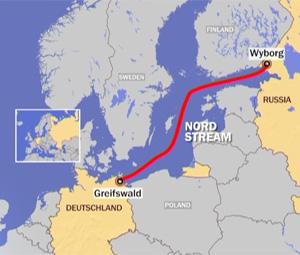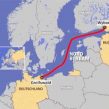
GERMAN VESTED INTERESTS RANKLED BY U.S. VIEW ON EUROPEAN ENERGY SECURITY
Publication: Eurasia Daily Monitor Volume: 5 Issue: 183
By:

According to German media reports, the Ministry of Foreign Affairs (MFA) in Berlin has protested to the U.S. Embassy over an op-ed article by the U.S. Ambassador in Sweden, who criticized the Russo-German Nord Stream gas pipeline project on the Baltic seabed and other aspects of Russian energy policy in Europe. Some German politicians and interested business parties backed up the MFA’s unprecedented move against an American diplomat’s latitude to address German and European public policy concerns.
The most detailed report of the incident appears in the current issue of the German news magazine Der Spiegel (reportedly Europe’s top-circulation weekly), after the story had broken in other German media (Der Spiegel, September 22; Handelsblatt, Deutsche Welle, September 12). According to these accounts, the German MFA’s economic affairs division chief Ruediger von Fritsch delivered a protest to U.S. Deputy Chief of Mission John Koenig in Berlin over the article published by U.S. Ambassador to Sweden Michael Wood, in the Stockholm daily Svenska Dagbladet. The German MFA expressed displeasure, asked for explanations, and wanted assurances that U.S. diplomats would refrain from such public expressions of their views on these issues.
German business figures such as Eggert Voscherau of BASF (the world’s largest chemical concern and a partner in the Gazprom-led Nord Stream consortium) and left-leaning politicians such as Martin Schulz (the Social Democrats’ leader in the European Parliament) in turn complained that the United States was now publicly opposing Nord Stream and in doing so was “destabilizing Europe.” Former chancellor Gerhard Schroeder, the figurehead chairman of the Nord Stream consortium, portrayed Russia as a fully reliable energy supplier (despite ample evidence to the contrary in recent years) and dismissed the need for a diversification of Europe’s supplies. In the same breath, however, Schroeder echoed the Kremlin’s blackmail message: Russia does have the option to diversify energy exports to Asia, to Europe’s detriment, he told a large audience of German and Russian businessmen in Dresden on September 16. Two days later, Schroeder and Gazprom CEO Alexei Miller visited Russian Prime Minister Vladimir Putin in Sochi to confer on the North Stream project and its public promotion. Even the Christian Democrats’ foreign policy spokesman in the Bundestag, Eckart von Klaeden (an Atlanticist uneasily toeing the party line on the Russian energy business) claimed that the Baltic seabed pipeline to Germany would not lead to one-sided dependence on Russia. Apparently, even the Christian Democrats do not consider a dependence level of more than 50 percent and projected to rise to be one-sided (International Herald Tribune, September 17; Bloomberg, September 18; Russian Television, Interfax, September 18; Der Spiegel, September 22).
U.S. Ambassador Wood’s op-ed article in Stockholm (Svenska Dagbladet, September 10), which triggered these German chain reactions, actually expresses views shared by many European analysts and editorialists, including German ones. Indeed, the prevailing editorial opinion in Germany is at odds with the coalition government’s industry-driven policy to increase energy dependence on Russia. That op-ed should even have been music to the ears of ecologically-minded Germans (mainly but not only on the left), thanks to its strong endorsement of renewable clean energy sources, its emphasis on combating global warming, and its call on American investors to join Swedish and European ones in alternative energy projects.
German vested interests were, however, rankled by the article’s recommendations to Sweden and other countries to “take a hard look” at the Gazprom-led Nord Stream project’s adverse implications for energy security and to reduce Europe’s heavy dependence on Russian supplies of oil and gas. Noting (in tune with other U.S. and some European officials) that Moscow uses the energy trade as a political instrument, Wood cautioned against easy acceptance of the Nord Stream, South Stream, and other Russian energy transport projects that are designed to bypass and isolate Western-friendly countries in the Baltic and Black Sea regions. In line with those countries’ aspirations and indeed with the declared U.S. policy, Wood urged Europeans to work with the energy producing and transit countries in Central Asia, the South Caucasus, Turkey, and the Black Sea region to develop direct transit routes, such as the Nabucco pipeline project, to European Union territory bypassing Russia. Wood cited Russia’s recent invasion of Georgia as a momentous event that underscores the need for reducing dependence on Russian energy supplies.
Given that Wood’s article is fully within the mainstream of European debates, as well as reflecting the known U.S. policy, the German MFA’s and other German reactions seem wholly disproportionate. The attempted overkill may seem designed to inhibit debate at the official level in Europe and apparently restrict a U.S. voice in that debate of all-European interest. The target, apparently, is not Wood but U.S. policy as such, which many Central and East European governments support within the EU.
According to Der Spiegel’s account, the U.S. embassy in Berlin responded by “underscor[ing] that Washington does not comment on the private pipeline projects” and that Wood’s article “may have been insufficiently screened in Washington.” Proponents of this argument, however, ignore the intergovernmental political nature of the Nord Stream and South Stream, as well as their function as part of Russia’s strategic policy in Europe.




